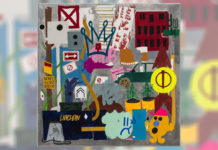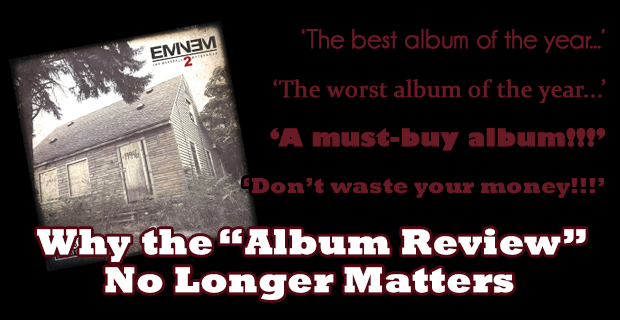The album review, once coveted as a necessary, trustworthy testimonial, has become obsolete.
In the day and age when anyone can (and often does) download an album for free, the “album review” is becoming an increasingly insignificant piece of journalism.
Back in the day, it made sense. When people had to part with hard-earned cash to buy an album, having only been exposed to whatever singles were on the radio, you wanted to know if the rest of the album was up to par.
You trusted dedicated music journalists to provide well-thought-out, critical analysis based on (in most cases) years of expertise, professional writing ability and a genuine sense of pride and respect for their work. This, so that you would know whether the quality of a radio single or two (the only access one typically had at the time to an artist’s current work) was replicated throughout the long-play, helping to influence your decision to buy.
These days, anyone with an opinion can (and often does) blog a review. In my home-genre of hip hop, the quality of music journalism is inversely proportional to the quantity of music journalism (in other words, it’s a whole lot of bad).
Even when a review is well-written, more often than not, the comments that follow are a wildly varied smorgasbord of alternative opinions and disregard for the opinion of the writer.
Even those who agree with the consensus or tone of a review in general, often take time to respond with their own reasoning, having heard the album themselves, becoming, in a weird way, yet another reviewer.
Though I have no hard evidence to prove it, I suspect nobody is basing their decision to buy or not buy an album on reviews. Even if they were, they would rarely find general consensus among the plethora of opinions. Not even with outlets generally regarded as reputable, as the perspective of, say, Pitchfork, generally differs hugely from that of HipHopDX.
So, really, what’s the point?
The end result is that the internet and its associated social media outlets get inundated with dozens of these album reviews, the majority of which are written by barely-if-at-all-qualified bloggers, interns, regular-ol’-people, with analysis that would vary as much as if you simply asked random people.
Which, considering the qualifications of many of these reviewers, is pretty much what is being done.
In fact, I’m pretty sure one of the things that a publication first asks of brand new writers and interns, is to review an album.
As if to say, “Anyone can do that.”
Sure there are a few exceptionally well-written reviews by exceptionally well-qualified reviewers. But even in those cases, how much do their pieces matter? Are they influencing sales in any way, like in the “old days”? Are they converting or convincing someone who may have already heard the album, to view it in a different way?
Probably not.
In an era where you can hear any album you want on any number of a myriad of media portals (illegally, through downloading and torrenting, and legally, through streaming, Spotify, etc.), and where it is therefore just that easy to form your own opinion on any music release you choose, there really is no point to reading, or writing, album reviews.
As a music publication owner, I am aware that there are a few who value our opinion, and would respect our analysis of music albums, but in the end, our analysis, indeed the analysis of any music journalist reviewing an album, simply serves no valuable purpose anymore.
Unless it’s a truly unique situation, such as an lesser-known independent artist releasing an album only on iTunes (as opposed to a free, streamable version somewhere), we’re usually happy enough to just post up news of an album release, provide a few words of background and context, and let listeners decide whether or not to listen, and what to feel. Since we’re not the type of site that posts every single thing that comes across our desk, our listeners can generally trust that if we post it, it is at least somewhat worthy or at the very least, notable.
Reviews of independent artists can still be valuable for a couple of reasons. One, to entice readers to actually listen to the work of an indie artist that they might very well have overlooked otherwise, and two, to offer that independent artist praise and/or critique, possibly helping that artist improve his or her craft (assuming they take such criticism to heart).
And again, assuming we are qualified to intelligently and objectively write a review in the first place.
But seriously, do music fans need to sift through 57 reviews of The Marshall Mathers LP 2 when they all differ, and rarely mirror their own individual thoughts?
The problem is that unless a reviewer has great insight, thorough enough knowledge, a grand enough perspective and an adequately high level of writing ability, the result of such reviews are, just a random person’s opinion stretched out and structured in the form of an article.
Rarely entertaining. Rarely educational. Rarely important.
As the owner and editor in chief of this music magazine, I have largely written off the idea of album/mixtape/EP reviews. Not because we don’t have the ability and not because our opinion and perspective wouldn’t be appreciated by our readership and the artists alike, because I believe they would be.
We just would much rather spend the same time and effort to better tell the stories that actually need to be told, advocate the issues that need advocating and advance the field of music journalism, than to spend time fighting for a piece of the album-review writing pie, a pie that has become as over-saturated as the “music business” itself.
Since both are dealing in quantity over quality, each has suffered, and we don’t see the value in contributing to the flood of relatively unimportant information in the process.
Across all genres, reviews are simply no longer the vital tool they once were, no longer necessary in helping consumers determine why one should or shouldn’t spend hard-earned money on a relatively unknown product.
Despite this, it is likely that outlets will continue writing album reviews. After all, most media outlets, particularly in the largely-inept field of hip hop journalism, care little about the quality of their work. They care if something they write will spark enough discussion among the least common denominator to elicit many clicks and ad views. They know that there will be disagreement, and trolls, and people spreading the link on their walls, adding notes of disagreement along the way.
That’s fine to them. Anything to continue pollinating the internet with the outlet’s brand.
So, despite the fact that these items provide little to no value, do nothing much more than clutter the already-cluttered landscape, and continue to contribute to the decline of quality music journalism, they will continue to spew the opinions of random, often-unqualified writers, simply because they know that enough people will disagree and argue about it.
It is typical of the uninspiring, build-a-list-and-they-will-click, new school methodology by which less-than-admirable media outlets drive traffic.
Controversy over content.
Quantity over quality.
I give that practice zero stars.





![The Underachievers – Crescendo [VIDEO]](https://www.birthplacemag.com/wp-content/uploads/2017/08/hqdefault-2-218x150.jpg)


![Fat Joe & Remy Ma ft. The-Dream – Heartbreak [VIDEO] Fat Joe Remy Ma The Dream - Heartbreak Video](https://www.birthplacemag.com/wp-content/uploads/2017/05/fat-joe-remy-ma-218x150.jpg)
![JSWISS featuring Chandanie – LML [VIDEO] JSWISS featuring Chandanie - LML [VIDEO]](https://www.birthplacemag.com/wp-content/uploads/2017/05/JSWISS-218x150.jpg)

![Akinyemi Ends Summer With “Summers” EP Release Show [9-17-17] Akinyemi 'Summers' EP release show at Brooklyn Bazaar](https://www.birthplacemag.com/wp-content/uploads/2017/09/summers-featured-218x150.jpg)
![4th Annual NYC VS EVERYBODY Yacht Party [9/16/17] #VSYacht 4th annual NYC VS Everybody Yacht Party#VSYacht](https://www.birthplacemag.com/wp-content/uploads/2017/09/vsyacht-218x150.jpg)







